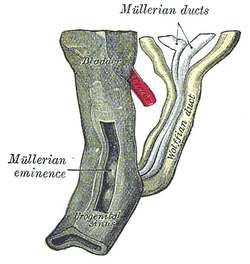The mesonephric duct, also known as the Wolffian duct, archinephric duct, Leydig's duct or nephric duct, is a paired organ that develops in the early stages of embryonic development in humans and other mammals. It is an important structure that plays a critical role in the formation of male reproductive organs. The duct is named after Caspar Friedrich Wolff, a German physiologist and embryologist who first described it in 1759.[1]
| Mesonephric duct | |
|---|---|
 Urogenital sinus of female human embryo of eight and a half to nine weeks old | |
| Details | |
| Carnegie stage | 11 |
| Days | 28 |
| Precursor | Intermediate mesoderm |
| Gives rise to | Vasa deferentia, seminal vesicles, epididymides, Gartner's duct |
| Identifiers | |
| Latin | ductus mesonephricus; ductus Wolffi |
| MeSH | D014928 |
| TE | duct_by_E5.6.2.0.0.0.4 E5.6.2.0.0.0.4 |
| Anatomical terminology | |
During embryonic development, the mesonephric ducts form as a part of the urogenital system.[2]
Structure
editThe mesonephric duct connects the primitive kidney, the mesonephros, to the cloaca. It also serves as the primordium for male urogenital structures including the epididymides, vasa deferentia, and seminal vesicles.
Development
editIn both males and females, the mesonephric ducts develop into the trigone of urinary bladder, a part of the bladder wall, but the sexes differentiate in other ways during development of the urinary and reproductive organs.
Male
editIn a male, they develop into a system of connected organs between the efferent ducts of the testis and the prostate, namely the epididymis, the vas deferens, and the seminal vesicle. The prostate forms from the urogenital sinus and the efferent ducts form from the mesonephric tubules.
For this, it is critical that the ducts are exposed to testosterone during embryogenesis. Testosterone binds to and activates androgen receptor, affecting intracellular signals and modifying the expression of numerous genes.[3]
In the mature male, the function of this system is to store and mature sperm, and provide accessory semen fluid.
Female
editIn the female, with the absence of anti-Müllerian hormone secretion by the Sertoli cells and subsequent Müllerian apoptosis, the mesonephric ducts regress, although inclusions may persist. The vestigial epoophoron arises from these ducts. Also, lateral to the wall of the vagina, a Gartner's duct could develop as a remnant.
Function
editSexual differentiation
editHistory
editIt is named after Caspar Friedrich Wolff who described the mesonephros and its ducts in his dissertation in 1759.[1]
Additional images
edit-
Diagram of a transverse section, showing the mode of formation of the amnion in the chick
-
Reconstruction of a human embryo of 17 mm
-
Cloaca of human embryo from twenty-five to twenty-seven days old
-
Tail end of human embryo thirty-two to thirty-three days old
-
Tail end of human embryo; from eight and a half to nine weeks old
See also
editReferences
edit- ^ a b synd/2845 at Who Named It?
- ^ Du, Hongling; Taylor, Hugh S. (January 1, 2015). "Chapter 27 - Development of the Genital System". In Moody, Sally A. (ed.). Principles of Developmental Genetics (Second ed.). Academic Press. pp. 487–504. doi:10.1016/b978-0-12-405945-0.00027-2. ISBN 9780124059450 – via ScienceDirect.
- ^ Hannema SE, Print CG, Charnock-Jones DS, Coleman N, Hughes IA (2006). "Changes in gene expression during Wolffian duct development". Horm. Res. 65 (4): 200–9. doi:10.1159/000092408. PMID 16567946. S2CID 2444520.